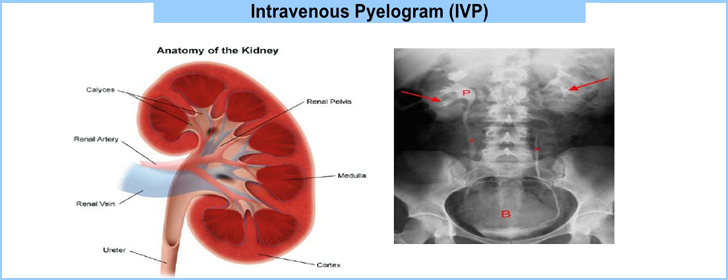
Intravenous pyelogram (IVP) is an x-ray exam that uses an injection of contrast material to evaluate your kidneys, ureters and bladder and help diagnose blood in the urine or pain in your side or lower back. An IVP may provide enough information to allow your doctor to treat you with medication and avoid surgery.
Inform your doctor if there’s a possibility you are pregnant and discuss any recent illnesses, medical conditions, medications you’re taking and allergies, especially to iodine-based contrast materials. Your doctor may instruct you to take a mild laxative the evening before the exam and to not eat or drink anything after midnight. Wear loose, comfortable clothing and leave jewelry at home. You may be asked to wear a gown.
An intravenous pyelogram (IVP) is an x-ray examination of the kidneys, ureters and urinary bladder that uses iodinated contrast material injected into veins.
An x-ray (radiograph) is a noninvasive medical test that helps physicians diagnose and treat medical conditions. Imaging with x-rays involves exposing a part of the body to a small dose of ionizing radiation to produce pictures of the inside of the body. X-rays are the oldest and most frequently used form of medical imaging.
When contrast material is injected into a vein in the patient's arm, it travels through the blood stream and collects in the kidneys and urinary tract, turning these areas bright white on the x-ray images. An IVP allows the radiologist to view and assess the anatomy and function of the kidneys, ureters and the bladder.
An intravenous pyelogram examination helps the radiologist assess abnormalities in the urinary system, as well as how quickly and efficiently the patient's system is able to handle fluid waste.The exam is used to help diagnose symptoms such as blood in the urine or pain in the side or lower back.
The IVP exam can enable the radiologist to detect problems within the urinary tract resulting from:
© 2011 Shivam Diagnostics & Cancer Research Institute All Right Reseverd. Site Design & Developed By Shreeya Web Solutions